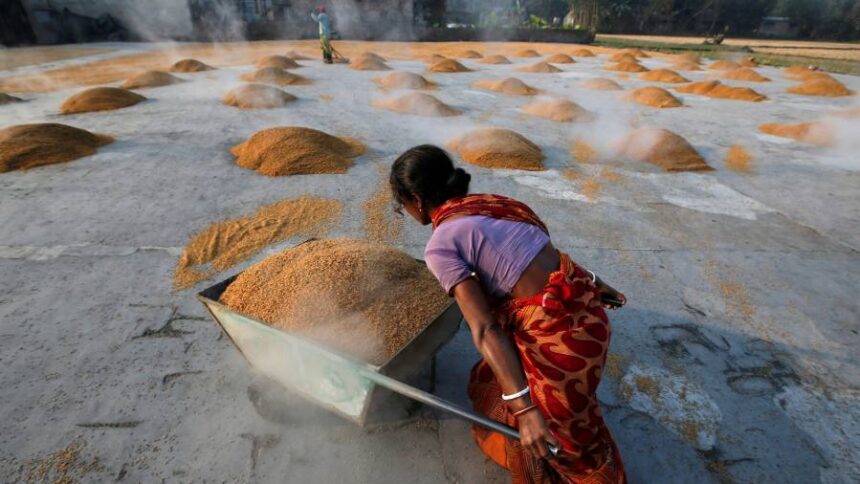Receive free Commodities updates
We’ll send you a myFT Daily Digest email rounding up the latest Commodities news every morning.
India has banned exports of non-basmati white rice, stoking fears of further global food inflation just as Russia’s targeting of grain ships has pushed up wheat and corn prices.
India’s ministry of consumer affairs said on Thursday it would prohibit exports to “lower the price as well as ensure availability in the domestic market”. Rice prices in India have risen 11.5 per cent over the past year and 3 per cent over the past month, according to the ministry, reflecting a 35 per cent year-on-year surge in export volumes between April and June.
India is the world’s biggest rice exporter, accounting for about 40 per cent of global exports. It is followed by Thailand and Vietnam, where prices for 5 per cent broken rice have also surged this year, raising costs for countries hoping to circumvent New Delhi’s ban. Higher prices for the grain — a staple for billions of people worldwide — are likely to stoke global food inflation, analysts said.
In September, India imposed a 20 per cent duty on exports of unmilled white rice, husked brown rice, semi-milled rice and wholly milled rice. As with the latest ban, the duty did not extend to basmati, India’s best-known variety of the grain.
India has been contending with higher food prices in recent weeks after heavy monsoon rains damaged crops and disrupted transport, raising the price of tomatoes and other staples.
“This is a knee-jerk reaction, especially given the fact that as of July 1 the government’s stocks of rice were three times the buffer stock norm,” said Ashok Gulati, a professor at the Indian Council for Research on International Economic Relations. “We are in an extremely comfortable position as far as the stocks are confirmed.”
Gulati said the move would push up global rice prices and particularly hit countries in Africa. However, he noted that the announcement of the ban said exports could still be allowed to countries that applied for Indian government permission “to meet their food security needs and based on the request of their government”.
“This [export ban] is a huge deal given that India is such an important country for rice production,” said Zanna Aleksahhina, grains analyst at commodities research group Mintec. “I hoped we had seen peak food inflation, but I’m concerned that might not be the case.”

Global rice inventories are forecast to fall to a six-year low of about 170mn metric tonnes by the end of the year, Aleksahhina added, with extreme weather likely to wreak further havoc over the coming months.
Kona Haque, head of research at ED&F Man, the agricultural trading house, said India’s ban on non-basmati rice exports showed the impact of El Niño. Tightness in the rice market could have a knock-on impact on wheat, she said, because “the two, both key food staples, can be almost substitutes”.
El Niño refers to a weather pattern that develops in the Pacific Ocean, as currents of warm water carry precipitation towards South America and create drier conditions in Australia and Asia.
India’s ban comes in the same week as Russia has begun bombing Ukrainian grain silos and pulled out of the Black Sea Grain Initiative, which for the past 11 months has allowed more than 30mn tonnes of Ukrainian grain and edible oils to be exported around the world. Wheat prices have jumped 11 per cent over the past five days. Corn has risen by almost 9 per cent.
Russia accounts for about one-fifth of the world’s wheat exports, while Ukraine before the war accounted for about one-tenth.
“Countries are already dealing with back-breaking food inflation, particularly poor countries,” said Arif Husain, chief economist at the UN World Food Programme. “When you’re especially dependent on food imports and your debt burden is severe, your currency is depreciating and interest rates are rising . . . if you’re a poor country who imports your food or fertiliser, you’re in trouble.”
The World Trade Organization last year exempted the World Food Programme from export bans, Husain added. “If we wanted to purchase rice from India, we could still do that.”
Additional reporting by Madeleine Speed in London








